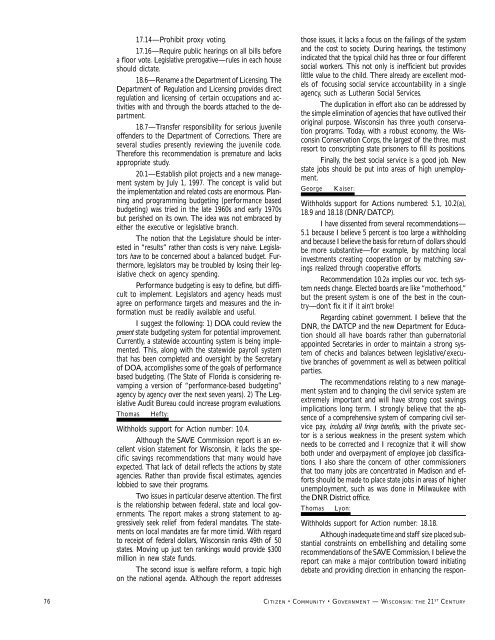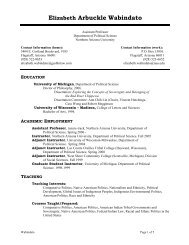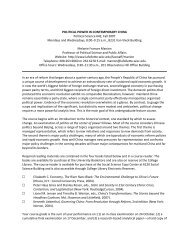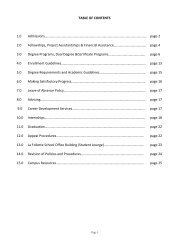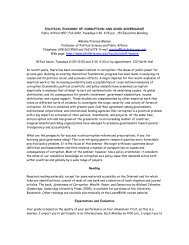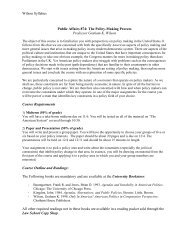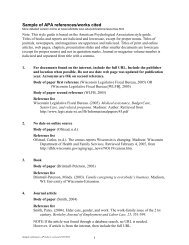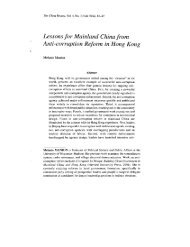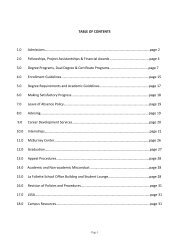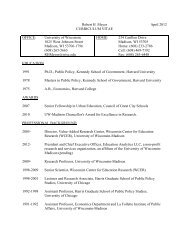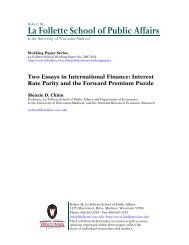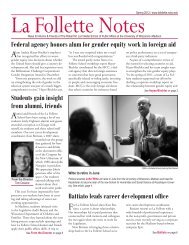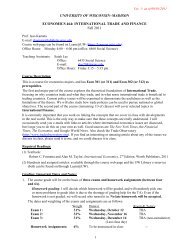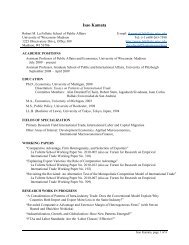SAVE Commission's findings - La Follette School of Public Affairs ...
SAVE Commission's findings - La Follette School of Public Affairs ...
SAVE Commission's findings - La Follette School of Public Affairs ...
You also want an ePaper? Increase the reach of your titles
YUMPU automatically turns print PDFs into web optimized ePapers that Google loves.
17.14—Prohibit proxy voting.<br />
17.16—Require public hearings on all bills before<br />
a floor vote. Legislative prerogative—rules in each house<br />
should dictate.<br />
18.6—Rename a the Department <strong>of</strong> Licensing. The<br />
Department <strong>of</strong> Regulation and Licensing provides direct<br />
regulation and licensing <strong>of</strong> certain occupations and activities<br />
with and through the boards attached to the department.<br />
18.7—Transfer responsibility for serious juvenile<br />
<strong>of</strong>fenders to the Department <strong>of</strong> Corrections. There are<br />
several studies presently reviewing the juvenile code.<br />
Therefore this recommendation is premature and lacks<br />
appropriate study.<br />
20.1—Establish pilot projects and a new management<br />
system by July 1, 1997. The concept is valid but<br />
the implementation and related costs are enormous. Planning<br />
and programming budgeting (performance based<br />
budgeting) was tried in the late 1960s and early 1970s<br />
but perished on its own. The idea was not embraced by<br />
either the executive or legislative branch.<br />
The notion that the Legislature should be interested<br />
in “results” rather than costs is very naive. Legislators<br />
have to be concerned about a balanced budget. Furthermore,<br />
legislators may be troubled by losing their legislative<br />
check on agency spending.<br />
Performance budgeting is easy to define, but difficult<br />
to implement. Legislators and agency heads must<br />
agree on performance targets and measures and the information<br />
must be readily available and useful.<br />
I suggest the following: 1) DOA could review the<br />
present state budgeting system for potential improvement.<br />
Currently, a statewide accounting system is being implemented.<br />
This, along with the statewide payroll system<br />
that has been completed and oversight by the Secretary<br />
<strong>of</strong> DOA, accomplishes some <strong>of</strong> the goals <strong>of</strong> performance<br />
based budgeting. (The State <strong>of</strong> Florida is considering revamping<br />
a version <strong>of</strong> “performance-based budgeting”<br />
agency by agency over the next seven years). 2) The Legislative<br />
Audit Bureau could increase program evaluations.<br />
Thomas Hefty:<br />
Withholds support for Action number: 10.4.<br />
Although the <strong>SAVE</strong> Commission report is an excellent<br />
vision statement for Wisconsin, it lacks the specific<br />
savings recommendations that many would have<br />
expected. That lack <strong>of</strong> detail reflects the actions by state<br />
agencies. Rather than provide fiscal estimates, agencies<br />
lobbied to save their programs.<br />
Two issues in particular deserve attention. The first<br />
is the relationship between federal, state and local governments.<br />
The report makes a strong statement to aggressively<br />
seek relief from federal mandates. The statements<br />
on local mandates are far more timid. With regard<br />
to receipt <strong>of</strong> federal dollars, Wisconsin ranks 49th <strong>of</strong> 50<br />
states. Moving up just ten rankings would provide $300<br />
million in new state funds.<br />
The second issue is welfare reform, a topic high<br />
on the national agenda. Although the report addresses<br />
those issues, it lacks a focus on the failings <strong>of</strong> the system<br />
and the cost to society. During hearings, the testimony<br />
indicated that the typical child has three or four different<br />
social workers. This not only is inefficient but provides<br />
little value to the child. There already are excellent models<br />
<strong>of</strong> focusing social service accountability in a single<br />
agency, such as Lutheran Social Services.<br />
The duplication in effort also can be addressed by<br />
the simple elimination <strong>of</strong> agencies that have outlived their<br />
original purpose. Wisconsin has three youth conservation<br />
programs. Today, with a robust economy, the Wisconsin<br />
Conservation Corps, the largest <strong>of</strong> the three, must<br />
resort to conscripting state prisoners to fill its positions.<br />
Finally, the best social service is a good job. New<br />
state jobs should be put into areas <strong>of</strong> high unemployment.<br />
George Kaiser:<br />
Withholds support for Actions numbered: 5.1, 10.2(a),<br />
18.9 and 18.18 (DNR/DATCP).<br />
I have dissented from several recommendations—<br />
5.1 because I believe 5 percent is too large a withholding<br />
and because I believe the basis for return <strong>of</strong> dollars should<br />
be more substantive—for example, by matching local<br />
investments creating cooperation or by matching savings<br />
realized through cooperative efforts.<br />
Recommendation 10.2a implies our voc. tech system<br />
needs change. Elected boards are like “motherhood,”<br />
but the present system is one <strong>of</strong> the best in the country—don’t<br />
fix it if it ain’t broke!<br />
Regarding cabinet government. I believe that the<br />
DNR, the DATCP and the new Department for Education<br />
should all have boards rather than gubernatorial<br />
appointed Secretaries in order to maintain a strong system<br />
<strong>of</strong> checks and balances between legislative/executive<br />
branches <strong>of</strong> government as well as between political<br />
parties.<br />
The recommendations relating to a new management<br />
system and to changing the civil service system are<br />
extremely important and will have strong cost savings<br />
implications long term. I strongly believe that the absence<br />
<strong>of</strong> a comprehensive system <strong>of</strong> comparing civil service<br />
pay, including all fringe benefits, with the private sector<br />
is a serious weakness in the present system which<br />
needs to be corrected and I recognize that it will show<br />
both under and overpayment <strong>of</strong> employee job classifications.<br />
I also share the concern <strong>of</strong> other commissioners<br />
that too many jobs are concentrated in Madison and efforts<br />
should be made to place state jobs in areas <strong>of</strong> higher<br />
unemployment, such as was done in Milwaukee with<br />
the DNR District <strong>of</strong>fice.<br />
Thomas Lyon:<br />
Withholds support for Action number: 18.18.<br />
Although inadequate time and staff size placed substantial<br />
constraints on embellishing and detailing some<br />
recommendations <strong>of</strong> the <strong>SAVE</strong> Commission, I believe the<br />
report can make a major contribution toward initiating<br />
debate and providing direction in enhancing the respon-<br />
76 CITIZEN • COMMUNITY • GOVERNMENT — WISCONSIN: THE 21 ST CENTURY


